Mostrar el registro sencillo del ítem
dc.contributor.author
Díaz, Silvina Alejandra

dc.date.available
2020-06-01T19:07:09Z
dc.date.issued
2016-06
dc.identifier.citation
Díaz, Silvina Alejandra; El relato de la memoria en el teatro de Buenos Aires; Universidad de Túnez "El Manar". Instituto Superior de Ciencias Humanas de Túnez; Dirāsāt Hispānicas; 3; 6-2016; 7-21
dc.identifier.uri
http://hdl.handle.net/11336/106409
dc.description.abstract
La recuperación de la memoria y el testimonio se han convertido en un requerimiento vital luego de la más cruenta dictadura militar argentina, que tuvo lugar entre 1976 y 1983. Los traumas históricos acarreados y las profundas heridas, individuales y colectivas, dieron lugar a innumerables hechos culturales. Nos proponemos analizar dos modos diversos, dentro de la dramaturgia de la posdictadura, de narrar la problemática de la represión y los desaparecidos, como paradigmas de toda una tendencia de textos que consideran al teatro como un instrumento de indagación social y política. La obra de Lola Arias recurre a un lenguaje referencial y explícito –propio del teatro político–, aun cuando contenga una importante carga simbólica, mientras que los textos de Omar Pacheco manifiestan la crisis del relato dramático tradicional y de la noción restrictiva que considera a la palabra únicamente en su dimensión psicologista y semántica, para destacar en cambio su materialidad y su opacidad sígnica.
dc.description.abstract
The recovery of memory and testimony has become a vital requirement after the most brutal Argentine military dictatorship that took place between 1976 and 1983. Hauled historical trauma and deep wounds, individual and collective, resulted in numerous cultural events. We intend to analyze two different ways, within the dramaturgy of the postdictatorship, narrate the question of repression and “desaparecidos”, like the paradigms of a whole trend of texts which the theatre as an instrument of political and social inquiry is considered. The work of Lola Arias calls for referential and explicit language –their own political theater– even though it contains an important symbolic sense. While the texts of Omar Pacheco manifest the crisis of the traditional dramatic narration and the notion of semantics, and restrictive that it considers the word only in its psychological dimension to instead highlight its materiality and its opacity means.
dc.format
application/pdf
dc.language.iso
spa
dc.publisher
Universidad de Túnez "El Manar". Instituto Superior de Ciencias Humanas de Túnez
dc.rights
info:eu-repo/semantics/openAccess
dc.rights.uri
https://creativecommons.org/licenses/by-nc/2.5/ar/
dc.subject
TEATRO
dc.subject
SOCIEDAD
dc.subject
MEMORIA
dc.subject
LENGUAJE
dc.subject.classification
Artes escénicas

dc.subject.classification
Arte

dc.subject.classification
HUMANIDADES

dc.title
El relato de la memoria en el teatro de Buenos Aires
dc.title
The Memory Narration in Buenos Aires Theater
dc.type
info:eu-repo/semantics/article
dc.type
info:ar-repo/semantics/artículo
dc.type
info:eu-repo/semantics/publishedVersion
dc.date.updated
2020-05-29T20:28:02Z
dc.identifier.eissn
2286-5977
dc.journal.number
3
dc.journal.pagination
7-21
dc.journal.pais
Túnez

dc.journal.ciudad
Tunez
dc.description.fil
Fil: Díaz, Silvina Alejandra. Consejo Nacional de Investigaciones Científicas y Técnicas; Argentina. Universidad de Buenos Aires. Facultad de Filosofía y Letras; Argentina
dc.journal.title
Dirāsāt Hispānicas
dc.relation.alternativeid
info:eu-repo/semantics/altIdentifier/url/http://dirasathispanicas.org/index.php/dirasathispanicas
dc.relation.alternativeid
info:eu-repo/semantics/altIdentifier/url/https://dirasathispanicas.org/index.php/dirasathispanicas/article/view/50
Archivos asociados
